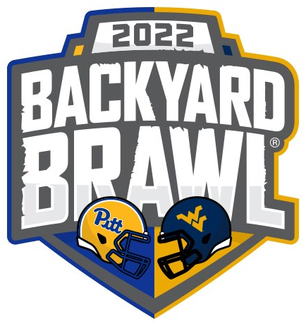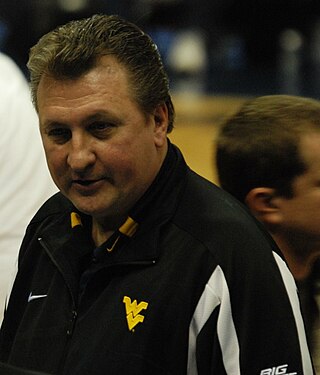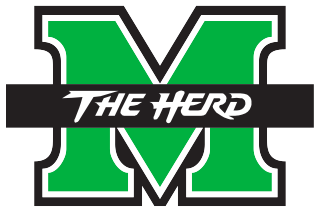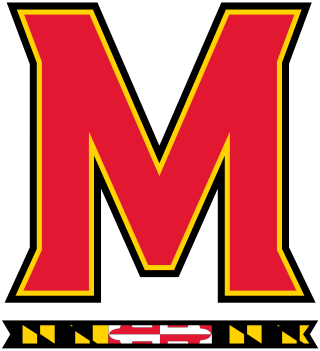
The Backyard Brawl is an American college football rivalry between the University of Pittsburgh Panthers and the West Virginia University Mountaineers. The term "Backyard Brawl" has also been used to refer to college basketball games played annually or semi-annually and may also be used to refer to other athletic competitions between the two schools. It is a registered trademark for both universities, and refers to the close proximity of the two universities, separated by 75 miles (105 km) along Interstate 79.

Robert Edward Huggins, nicknamed "Huggy Bear", is an American college basketball coach. He was the head coach at Walsh, Akron, Cincinnati, Kansas State, and West Virginia. He was inducted into the Naismith Memorial Basketball Hall of Fame in 2022.

The Virginia Tech–West Virginia football rivalry is an American college football rivalry between the Virginia Tech Hokies and West Virginia Mountaineers. The teams met 53 times between 1912 and 2021, every year from 1973 to 2005, and as conference foes from 1991 to 2003 as members of the Big East Conference. The winner of the game receives the Black Diamond Trophy sponsored by Rish Equipment Company, headquartered in Bluefield, West Virginia. It was introduced in 1997 and was meant to symbolize the Appalachian region's rich coal heritage

The Friends of Coal Bowl is the name given to the Marshall–West Virginia football rivalry. It is an American college football rivalry game played by the Marshall Thundering Herd football team of Marshall University and the West Virginia Mountaineers football team of the West Virginia University. The game was sponsored by the Friends of Coal, a coal industry trade group. Planned to be a seven-year series, the Friends of Coal Bowl was organized by the West Virginia Coal Association at the urging of West Virginia Governor Joe Manchin.

The West Virginia Mountaineers football team represents West Virginia University in the NCAA Football Bowl Subdivision (FBS) of college football. West Virginia plays its home games at Milan Puskar Stadium on the campus of West Virginia University in Morgantown, West Virginia. The Mountaineers have won or shared a total of 15 conference championships, including eight Southern Conference titles and seven Big East Conference titles. The Mountaineers compete in the Big 12 Conference and are led by head coach Neal Brown.

The Marshall Thundering Herd is the intercollegiate athletic collection of teams that collectively represent the Marshall University in Huntington, West Virginia. Thundering Herd athletic teams compete in the Sun Belt Conference, which are members of the NCAA Division I. The school's official colors are kelly green and white. The Marshall Thundering Herd have won 3 NCAA national championships and one NAIA national championship.

The West Virginia Mountaineers men's basketball team represents West Virginia University in NCAA Division I college basketball competition. They are a member of the Big 12 Conference. WVU has won 13 conference tournament championships, and has 31 appearances in the NCAA tournament, including two Final Fours, most recently in 2010. The Mountaineers have also appeared in 16 National Invitation Tournaments (NIT), and have won the tournament twice, in 1942 and 2007. The 1942 NIT Championship is claimed by West Virginia as a National Championship.

The Maryland–West Virginia football rivalry is an American college football rivalry between the Maryland Terrapins and West Virginia Mountaineers. The two schools are strong rivals due to several factors, including similar recruiting areas and the relatively short distance between each other, approximately 210 miles (340 km) apart. The two teams first played in 1919 and the series ran uninterrupted from 1980 to 2007. West Virginia leads the series 28–23–2. The two teams met for the Gator Bowl for a rematch at the end of the 2003 season. Until the series lapsed in 2007, the game was the longest continuously running non-conference game for both schools. The two teams met again in Morgantown in 2015 and in College Park in 2021, with West Virginia and Maryland winning respectively.

The Marshall Thundering Herd baseball team represents the Marshall University in NCAA Division I college baseball and competes in the Sun Belt Conference. The current head coach of the Herd is Greg Beals. Marshall plays its home games at Jack Cook Field, a 3,500 seat on-campus facility which opened for the 2024 season.

The Marshall Thundering Herd men's basketball team represents Marshall University in Huntington, West Virginia. They compete in the NCAA Division I as a member of the Sun Belt Conference. The Thundering Herd are led by head coach Cornelius Jackson and play their home games at the on-campus Cam Henderson Center which opened in 1981.

The Marshall Thundering Herd football team is an intercollegiate varsity sports program of Marshall University. The team represents the university as a member of the Sun Belt Conference East Division of the National Collegiate Athletic Association, playing at the NCAA Division I Football Bowl Subdivision level.
The 2010 West Virginia Mountaineer football team represented West Virginia University in the college football season of 2010. The Mountaineers were led by head coach Bill Stewart and played their home games on Mountaineer Field at Milan Puskar Stadium in Morgantown, West Virginia. They were members of the Big East Conference. They finished the season 9–4, 5–2 in Big East play to share the conference title with Connecticut and Pittsburgh. They were invited to the Champ Sports Bowl where they were defeated by North Carolina State 7–23.
The 2012 West Virginia Mountaineers football team represented West Virginia University in the 2012 NCAA Division I FBS football season. The season marked the Mountaineers' first season as members of the Big 12 Conference. In addition, the 2012 season was the first for the team since 1942 without a Backyard Brawl matchup against their top rival Pittsburgh due to their exit from the Big East Conference after the 2011 season. The Mountaineers were led by Dana Holgorsen in his second season as head coach. Joe DeForest and Keith Patterson served as co-defensive coordinators in their first season at WVU, while Shannon Dawson was elevated to offensive coordinator after serving as the team's receivers coach in the 2011 season. West Virginia played its home games on Mountaineer Field at Milan Puskar Stadium in Morgantown, West Virginia.

Tony Caridi is a children's book author and an American sportscaster for West Virginia University's Mountaineer Sports Network and West Virginia Radio Corporation's Metronews Radio Network.

The 2017–18 West Virginia Mountaineers men's basketball team represented West Virginia University during the 2017–18 NCAA Division I men's basketball season. The Mountaineers were coached by Bob Huggins, in his 11th season as WVU's head coach, and played their home games at the WVU Coliseum in Morgantown, West Virginia as members of the Big 12 Conference. They finished the season 26–11, 11–7 in Big 12 play to finish in a tie for second place. They defeated Baylor and Texas Tech to advance to the championship game of the Big 12 tournament where they lost to Kansas. They received an at-large bid to the NCAA tournament where they defeated Murray State and Marshall to advance to the Sweet Sixteen, where they lost to Villanova.

The 2018–19 West Virginia Mountaineers men's basketball team represented West Virginia University during the 2018–19 NCAA Division I men's basketball season. The Mountaineers were coached by Bob Huggins, in his 12th season as WVU's head coach, and played their home games at the WVU Coliseum in Morgantown, West Virginia as members of the Big 12 Conference. In a season of bad records, the team finished with the most losses in a season in school history and also had its first last-place finish in Big 12 Conference play. They finished the season 15–21, 4–14 in Big 12 Play to finish in last place. They defeated Oklahoma and Texas Tech to advance to the semifinals of the Big 12 tournament where they lost to Kansas. They received an at-large bid to the College Basketball Invitational where they defeated Grand Canyon in the first round before losing in the quarterfinals to Coastal Carolina.

The 2020 Marshall Thundering Herd football team represented Marshall University in the 2020 NCAA Division I FBS football season. The Thundering Herd played their home games at Joan C. Edwards Stadium in Huntington, West Virginia, and competed in the East Division of Conference USA (CUSA). They were led by eleventh-year head coach Doc Holliday.

The Mountain State derby is the name given to the men's soccer games between the Marshall Thundering Herd and the West Virginia Mountaineers, the only NCAA Division I programs in the state of West Virginia.

The 2022 Marshall Thundering Herd football team represented Marshall University during the 2022 NCAA Division I FBS football season. The Thundering Herd played their home games at the Joan C. Edwards Stadium in Huntington, West Virginia, and competed in the East Division of the Sun Belt Conference. The team was coached by second-year head coach Charles Huff.

The Appalachian State–Marshall football rivalry, known colloquially as The Old Mountain Feud, is a college rivalry between the Mountaineers of Appalachian State University in Boone, North Carolina, and the Thundering Herd of Marshall University in Huntington, West Virginia. The rivalry is significant for the competitiveness of the contests, as well as its place in contemporary Appalachian culture. Both campuses residing in the Appalachian Mountains, the two public universities both were once teacher's academies.










